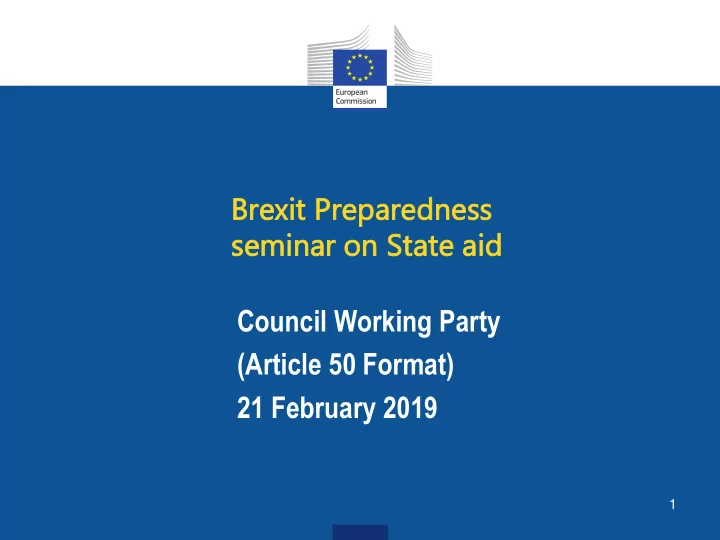

Br Brexi xit Prepare aredn dness ss semi mina nar on on State ate ai aid d Council Working Party (Article 50 Format) 21 February 2019 1
Key issues 1/2 • Need to prepare for all possible outcomes • European Council (Article 50) conclusions of 13 December 2018 • Challenges faced by Member States and EU businesses • Need for infrastructure reinforcement • Need for SMEs to adapt to new procedures for customs • Liquidity needs due to abrupt disruption of trade 2
Key issues 2/2 • No-deal Brexit and EU State aid legal framework • Negative effects of no-deal Brexit can be alleviated under existing State aid rules • No legislative changes required, but in few fields the application of State aid rules will require taking into account the fact the UK is no longer a Member State eligibility for State aid or the amounts of State aid that can be granted may be affected 3
Mitigating Brexit consequences via existing State aid rules - Examples • Customs procedures and development of new markets Enhance SME preparedness (GBER) • Acute liquidity problems Safety net for SMEs (R&R) • Access to finance measures (no aid/de minimis) • Change in existing business and business diversification Support for urgent investment needs for SME (GBER) • Airports and ports Support for infrastructure adaptations (no aid/GBER) 4
Changes to practical application of State aid rules 1/2 • Impact on beneficiaries and Member States • Operation of national aid schemes affected by Brexit? possible non-eligibility for aid with immediate consequences! – National tonnage tax schemes EEA flag requirements – Seafarer schemes are you using UK financial intermediaries for fund-based aid schemes (e.g. risk finance)? 5
Changes to practical application of State aid rules 2/2 • Impact on Member States only • European Territorial Cooperation projects (GBER Art. 14(15) & 20) non-eligibility of UK regions in bilateral projects less aid for existing multilateral ETC projects involving the UK • Research and development projects (GBER Art. 25(6) & RDI GL) less aid for new bilateral projects involving the UK • Air/maritime links remote areas and EEA country (GBER Art. 51) non-eligibility of connections with the UK for social aid • Aid schemes for audiovisual works (GBER Art. 54(7) & Cinema GL) less aid for new bilateral co-production with the UK 6
Next steps • COMP • Ready to engage with Member States affected by a no-deal Brexit and explore pragmatic and efficient support solutions, in line with EU State aid law • Member States • Invited to come forward quickly and with concrete proposals 7
Recommend
More recommend